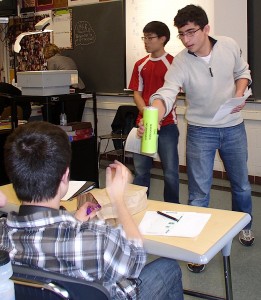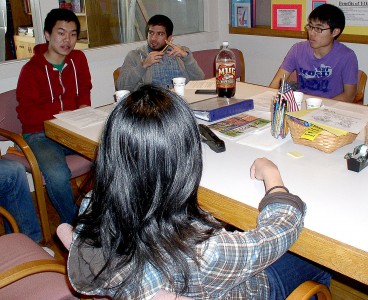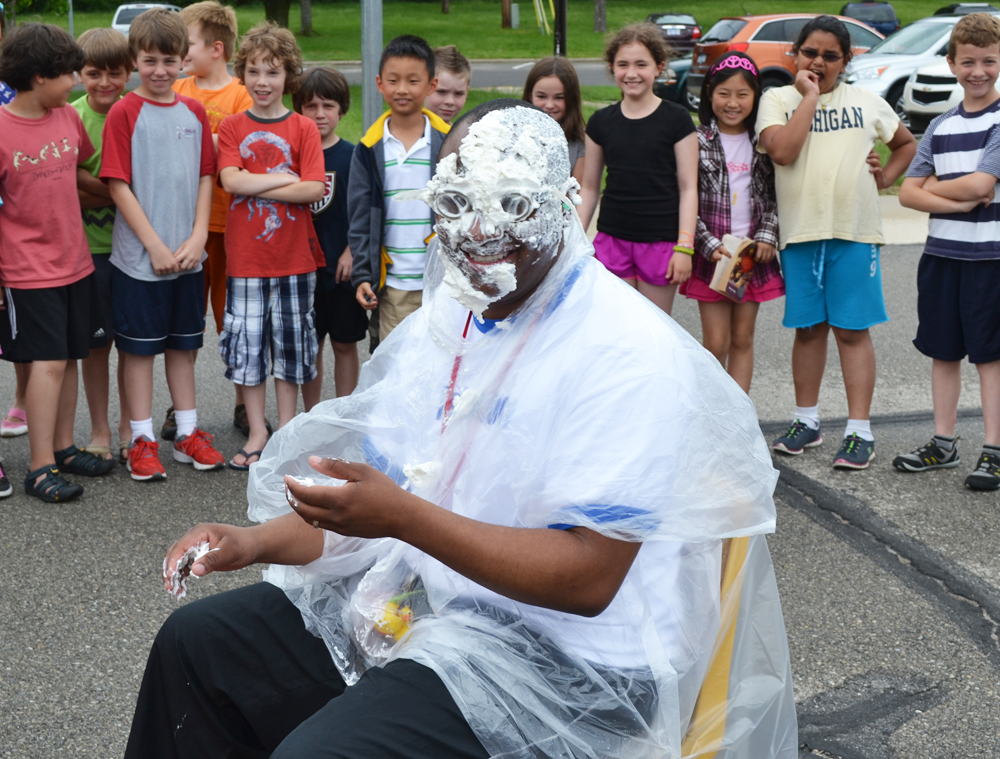Editor’s note: This is the final story in a series about school board-approved community groups in The Ann Arbor Public Schools. These groups have a regular seat and presentation slot at Ann Arbor school board meetings. Today we look at the Youth Senate.
Featured Nov. 8, 2010: The Ann Arbor Parent Advisory Committee for Special Education (AAPAC)
Featured Dec. 13, 2010: The Ann Arbor PTO Council (AAPTOC)
Featured Jan. 17, 2011: Black Parents’ Student Support Group (BPSSG)
By Casey Hans
AAPSNews Service
On a recent morning, Pioneer High School sophomores Zaid Khatib and Hyun Won shared their findings about poverty in Washtenaw County, as part of their involvement with the Youth Senate Action Team.

Khatib told classmates that 50,000 people are living in poverty here and Won shared that there are 5,000 people homeless in the county at any given time.
“That’s more than the populations of Huron and Pioneer high schools combined,” Won said. “And 30 percent of the homeless population is youth; the average age is 9,” he reported. “Can you imagine?”
Khatib and Won are among many Ann Arbor high school students learning about social justice, community volunteering, civic engagement and philanthropy through the Youth Senate program. The two are in their first year of Youth Senate. “It’s really an enjoyable experience,” said Khatib. Won said what he likes best about it is the way the Youth Senate groups and projects help the community.
Youth Senate members have the opportunity to address the Ann Arbor Board of Education during regular updates given by board-approved groups which also include the Ann Arbor Parent Advisory Committee for Special Education, the Black Parent Student Support Group, the AAPS Parent Teacher Organization (PTO) Council and the district’s representative collective bargaining units.
Students in all grades from all five Ann Arbor high schools participate in the Youth Senate, with many participating at the school level on Senate Action Teams and together at a weekly Youth Senate leadership meeting. Students also take turn preparing updates and presentations to the school board.
Ebba Hierta works for the nonprofit Youth Empowerment Project that acts as an adviser to the Youth Senate She said students from any group, including YEP-affiliated groups, use the designated seat time to address the board with proper preparation. She notes that a disclaimer is read before each report, saying that the student reports do not represent entire student bodies and encourages a diverse student population to be heard.

“The Youth Senate fosters youth activities throughout the community,” Hierta said. “They create a voice at the school district level.”
At the individual school level, the Pioneer Youth Senate Action Team has focused this year on the issue of local poverty and homelessness in Washtenaw County, studying statistics of the problem and working directly with homeless residents on Friday nights, helping to serve food in downtown Ann Arbor.
During the recent Pioneer Youth Senate Action Team’s classroom presentations and outreach to fellow students, the group collected more than $275 to donate to the Washtenaw Intermediate School District Education Project for Homeless Youth and provide small leadership development scholarships.
One of the classrooms they visited was that of Social Studies teacher Jen Kunec, who told her students that many people losing jobs and their houses. “A lot of people don’t have resources to turn to,” she said.
Won said while classmates might worry about getting their homework done, or have other, more routine, problems, homeless families have bigger concerns. “These kids are thinking ‘what am I going to eat tonight?’” he said. “Where am I going to sleep? Of all of the people I’ve met, they’re so happy and content with the small things they have.”
He noted that “not even 100 people in this county help every day with the problem. There are just a few who regularly help,” he said.
Won and Khatib were among students attending a Friday afternoon leadership meeting at YEP offices on Huron Street in downtown Ann Arbor, where a handful of students from Pioneer and Huron shared their experiences.
Enze Xing, a Pioneer sophomore, said the poverty topic is what drew her to become involved. “I thought that was an important topic and I should get involved with it,” she said. “It affects so many people and not many people know about it. Washtenaw County is second in the state” for the number of homeless.
Jack Fan, a Pioneer junior, saw the Youth Senate Action Team presentations last year and decided to get involved. “I thought it would be cool,” he said. “We wanted it to be more applicable this year” and so chose the local poverty initiative.
Huron High students are working on a follow-up to a project that took place four years ago on achievement disparities in all high schools called “Leap the Gap!” A total of 1,500 students among all Ann Arbor high schools were surveyed and 27 barriers to achievement were noted and reported to the school board.
Asma Hussain, a Huron senior, explained that the current project, Achievement Solutions Teams, is using focus groups that are discussing barriers in students’ personal lives, to see how barriers are perceived and to find some solutions to those. The project will use peer coaching to help students make choices for academic success.
Skyline students also have a Student Forum Action Team that is organizing and beginning community projects there and has been involved with leadership training and volunteering. Community High’s Student Forum Council is discussing ways of teaming with their peers across the district.
Each year’s involvement throughout the district can range in numbers from 175 to upwards of 500, depending on the topics that local schools decide to tackle, Hierta said. Some students stay involved only at the school level, while others choose to take a leadership role at the district level of Youth Senate.
The organization began in the late 1990s to encourage teen involvement in community service and civic engagement, philanthropy, partnerships, leadership and social entrepreneurship. It became a board-approved group that visits the school board to offer updates on a variety of student-driven community service projects.
One of the largest Youth Senate efforts in recent years was a “Fight Poverty in Africa Project,” which was initiated by students at Community High School and involved students throughout the district. It taught philanthropy and was a “very strong service-learning experience,” Hierta said. “It was a great example of positive peer influence,” she added.


